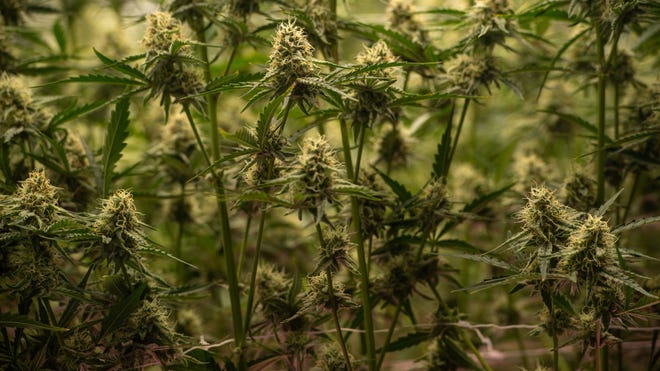Amendment 3 would have allowed adult-use marijuana in the state in six months’ time. With it going several percentage points short of passage on Election Day, the hopes of weed users and companies went up in smoke.
While there are hopes President-elect Donald Trump will be favorable to the industry, since he supported the amendment, he’s in no way endorsed federal legalization.
And there’s no expectation that the incoming batch of lawmakers will be the ones to usher in the recreational product — especially considering Gov. Ron DeSantis’ opposition to it.
“Members are allowed to file whatever bills they want to file (but) my position has been clear,” House Speaker-designate Daniel Perez, a Republican from Miami who also was against the ballot measure, said in a statement.
Yet, while Amendment 3 didn’t reach the required 60% approval threshold, a majority of voting Floridians – around 56% – still supported it.
Republican state Sen. Joe Gruters of Sarasota, like his ally Trump, thinks it’s just “a matter of time” till Florida joins the dozens of other states with recreational marijuana. “Certainly we could start doing things around the side,” he said.
To that end, Gruters plans on filing “a bill or two” for the 2025 legislative session.
Gruters is a former state Republican Party chair that Trump endorsed to be Florida’s next chief financial officer. He stood out among legislative Republicans this year for being a vocal supporter of Amendment 3.
He doesn’t know exactly what his bills will do since he’s working with other lawmakers to see what can pass the Republican supermajority in both chambers. Gruters did mention possibilities of making veterans exempt from yearly medical marijuana use fees and allowing Floridians to grow their own marijuana at home.
DeSantis, other Amendment 3 opponents pointed to measure’s no go on home grow
DeSantis and other conservative opponents to Amendment 3 made a big deal about the measure not allowing home grow. Amendment 3 supporters said they supported it but couldn’t fit it into the language due to state Supreme Court “single subject” requirements.
Before Election Day, opponents also claimed that the amendment would have prevented public use restrictions. While Gruters said that was never true, he added that he’s for preemptively putting those restrictions in place during the upcoming session: “Let’s start building the building blocks for the framework to make everybody comfortable,” he said.
A slew of Florida’s largest marijuana companies also expressed enthusiasm in working with DeSantis and lawmakers on new policy.
“We believe there is a significant unmet demand for safe, regulated cannabis in Florida, and we look forward to working with the Governor’s team and lawmakers to address barriers that hinder additional progress,” said George Archos, founder and CEO of Verano, in a statement.
Trulieve CEO Kim Rivers said she was “looking forward to working with the legislature on the next steps to ensure safe access to marijuana for adults in Florida, decriminalization for personal possession and home grow.”
But Sen. Ben Albritton, the incoming Senate president, told the Tampa Bay Times he doesn’t support expanding marijuana beyond the medical program. DeSantis’ office didn’t respond to a request for comment
What’s Trump’s take on marijuana?
While Trump endorsed Amendment 3, he’s never endorsed federal recreational marijuana legalization.
In his social media announcement of the endorsement, Trump wrote that his administration would support “states’ rights to pass marijuana laws, like in Florida, that work so well for their citizens.”
“I believe it is time to end needless arrests and incarcerations of adults for small amounts of marijuana for personal use,” he wrote.
Trump also said he would work with Congress on opening the banking system to marijuana companies and continue the Biden administration’s efforts to reclassify marijuana from a Schedule I drug with no medical value on par with heroin, to a Schedule III drug on par with ketamine and anabolic steroids.
“President-elect Trump has embraced federal cannabis reform and voiced support for the right of states to set their own cannabis laws,” said the U.S. Cannabis Council, which advocates for a regulated recreational marijuana industry, in a statement.
“His support for the SAFE Banking Act and reclassification of cannabis down to Schedule III will help make Florida’s medical cannabis market stronger and more secure.”



